Veranstaltungen und Aktivitäten
New DIJ Miscellanea The Digital Transformation published
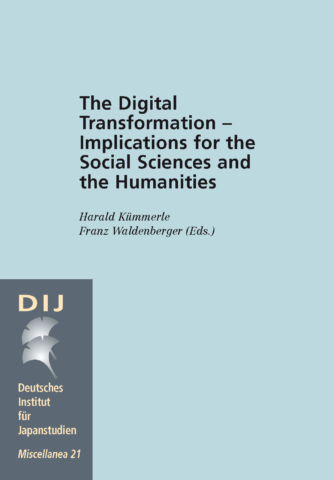 The term digital transformation (DT) has become omnipresent in our personal, social, economic, political, cultural, and academic lives. What are the implications of DT for the social sciences and humanities? This new volume of our DIJ Miscellanea series approaches DT by exploring technological developments and methodology, research data and infrastructure, new research objects and perspectives as well as shifting boundaries of the social sciences and humanities. The publication is the outcome of the workshop “The Digital Transformation – Implications for the Social Sciences and the Humanities” at the DIJ in September 2019. Co-organized by the Nippon Institute for Research Advancement (NIRA) and the German Centre for Research and Innovation Tokyo (DWIH), it brought together scholars from Japan and abroad. The volume consists of ten chapters, including one each by DIJ social scientist Susanne Brucksch („Insights into the Digital Transformation From the Fields of Medicine and Healthcare in Japan“) and the co-editors Harald Kümmerle („Postscript: Comparative and historical perspectives on the digital transformation“) and Franz Waldenberger („Knowledge production and the role of SSH in the digital age“). It is available for free download here
The term digital transformation (DT) has become omnipresent in our personal, social, economic, political, cultural, and academic lives. What are the implications of DT for the social sciences and humanities? This new volume of our DIJ Miscellanea series approaches DT by exploring technological developments and methodology, research data and infrastructure, new research objects and perspectives as well as shifting boundaries of the social sciences and humanities. The publication is the outcome of the workshop “The Digital Transformation – Implications for the Social Sciences and the Humanities” at the DIJ in September 2019. Co-organized by the Nippon Institute for Research Advancement (NIRA) and the German Centre for Research and Innovation Tokyo (DWIH), it brought together scholars from Japan and abroad. The volume consists of ten chapters, including one each by DIJ social scientist Susanne Brucksch („Insights into the Digital Transformation From the Fields of Medicine and Healthcare in Japan“) and the co-editors Harald Kümmerle („Postscript: Comparative and historical perspectives on the digital transformation“) and Franz Waldenberger („Knowledge production and the role of SSH in the digital age“). It is available for free download here
Issue 32(2) of Contemporary Japan published
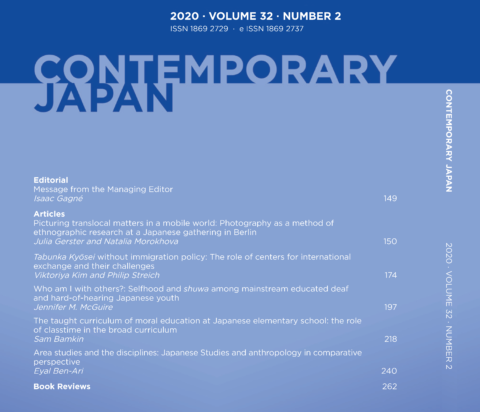
The latest issue of Contemporary Japan is now available online and in print. CJ32(2) features a range of articles exploring: photography and ethnographic research among Japanese in Berlin (Julia Gerster & Natalia Morokhova); the role of centers for international exchange in multicultural community building (Viktoriya Kim & Philip Streich); notions of selfhood among deaf and hard-of-hearing youth (Jennifer M. McGuire); and moral education in elementary school classrooms (Sam Bamkin). This issue also features an Invited Commentary by Eyal Ben-Ari reflecting on the relationship between area studies and the disciplines and the adaptive potential of Japanese Studies. Plus: five reviews of recently published books on the self-defense forces, food safety, gardening, memory in Hiroshima, and economic history. Please see the full issue here
Journal article on dislocation and social isolation in post-3.11 Japan

What happens when temporary shelters become permanent homes? What are the psychosocial impacts of prolonged dislocation, and how might these effects be mitigated through grassroots community activities? Based on fieldwork and interviews with residents in temporary housing and volunteer support groups in northeastern Japan, Isaac Gagné’s new article „Dislocation, Social Isolation, and the Politics of Recovery in Post-Disaster Japan“ (Transcultural Psychiatry) analyzes the ongoing challenges of delayed recovery and chronic dislocation among survivors of the March 11, 2011 disaster in Japan. Focusing on Natori City, Miyagi Prefecture, Isaac examines how the complexity of the disaster-recovery process within the local politics of the region has produced new tensions, creating a particular “zoned liminality” for displaced residents while undermining the social nexus of community relations. The article also reflects on challenges in treating the psychosocial trauma among survivors, and how their needs are addressed through new citizen-based volunteer movements.
New book chapter on women in Düsseldorf’s food community
 A new book chapter by Nora Kottmann addresses life choices of Japanese women who live and work abroad. Focusing on women employed in Japanese culinary locales in a quarter called ‚Little Tokyo‘ in the German city of Düsseldorf, it asks: Why do these women choose to work in the Japanese food service sector? What role do Düsseldorf’s Japanese community and the respective foodscape play in these women’s decision to move? Findings reveal that the choice of employment is mostly pragmatic and rarely the main reason for moving abroad. However, work in the food sector can serve as an opportunity to accomplish the dream of being in charge of one’s own life. The chapter “Japanese women on the move: Working in and (not) belonging to Düsseldorf’s Japanese (food) community” is part of the volume Food identities at Home and on the Move (edited by Raúl Matta, Charles-Édouard de Suremain, Chantal Crenn).
A new book chapter by Nora Kottmann addresses life choices of Japanese women who live and work abroad. Focusing on women employed in Japanese culinary locales in a quarter called ‚Little Tokyo‘ in the German city of Düsseldorf, it asks: Why do these women choose to work in the Japanese food service sector? What role do Düsseldorf’s Japanese community and the respective foodscape play in these women’s decision to move? Findings reveal that the choice of employment is mostly pragmatic and rarely the main reason for moving abroad. However, work in the food sector can serve as an opportunity to accomplish the dream of being in charge of one’s own life. The chapter “Japanese women on the move: Working in and (not) belonging to Düsseldorf’s Japanese (food) community” is part of the volume Food identities at Home and on the Move (edited by Raúl Matta, Charles-Édouard de Suremain, Chantal Crenn).
New DIJ Miscellanea Venezianische Wahrheiten (in German)

Japan and Italy have many things in common. Both are rich, industrialised countries with a long cultural tradition that is held in high esteem worldwide. People in both countries enjoy a longer life than almost anywhere else in the world. For both countries, the processes of ageing and population shrinkage are challenges with diverse social, economic, and political facets. But Japan and Italy also differ in many respects, e.g. in social conventions, etiquette, work ethics and everyday behaviour. These similarities and differences make a comparison attractive. Former DIJ director Florian Coulmas has recorded his observations, insights, and experiences during a semester he spent at the University of Venice Ca‘ Foscari in the new publication Venezianische Wahrheiten. Japanische Lektionen in der Stadt Marco Polos (in German). The booklet is published as volume 20 in the DIJ Miscellanea series and available for download here.
Journal article on agenda-cutting as a neglected media phenomenon
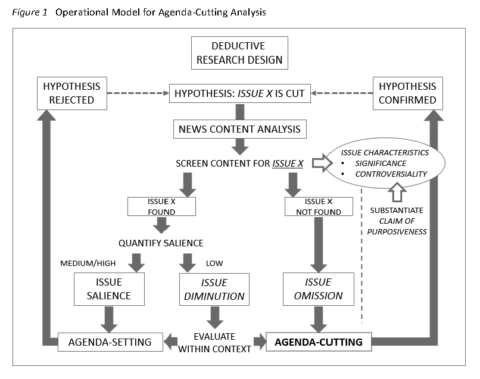
The journal Journalism Studies has published a new article by our PhD fellow Yosuke Buchmeier on agenda-cutting as a neglected media phenomenon. While agenda-setting has developed into one of the leading concepts in communication studies, „agenda-cutting“ – a media phenomenon that can be observed when a relevant issue is de-emphasized, entirely omitted or removed from a news agenda – has so far remained a theoretical blind spot. Based on observations from Japan, Yosuke’s paper „Towards a Conceptualization and Operationalization of Agenda-Cutting: A Research Agenda for a Neglected Media Phenomenon“ proposes agenda-cutting as a result of media’s anticipatory obedience and self-censorship. It argues that the non-reflected, tacit assumption of agenda-cutting as a by-concept to agenda-setting represents one cause for its theoretical neglect. This paper aims to initiate a scholarly debate by establishing conceptual common ground and proposing a research direction for what the author considers an unduly neglected media phenomenon. Available open access here
Barbara Holthus reviews Aaron Skabelund’s Empire of dogs
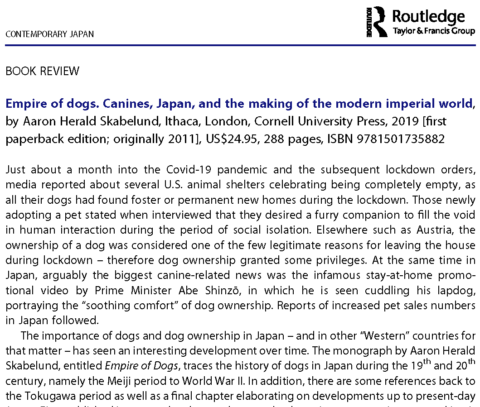 „The book on the history of (dog) culture is situated in the crosshairs of culture, history, modernity, society, and animals, and therefore makes for a rare and eye-opening account of the times. […] Skabelund does a great job showing how the construction of human races and animal breeds are interrelated and interwoven.“ Barbara Holthus‚ book review of Aaron Herald Skabelund’s Empire of dogs. Canines, Japan, and the making of the modern imperial world (Cornell University Press, 2019) has just been published online first in Contemporary Japan. Details
„The book on the history of (dog) culture is situated in the crosshairs of culture, history, modernity, society, and animals, and therefore makes for a rare and eye-opening account of the times. […] Skabelund does a great job showing how the construction of human races and animal breeds are interrelated and interwoven.“ Barbara Holthus‚ book review of Aaron Herald Skabelund’s Empire of dogs. Canines, Japan, and the making of the modern imperial world (Cornell University Press, 2019) has just been published online first in Contemporary Japan. Details
New book chapter on gender gap in social movement participation
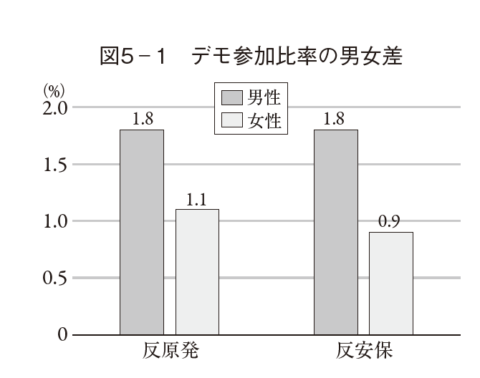
DIJ deputy director Barbara Holthus has co-authored with Naoto Higuchi (Waseda University) a chapter on the gender gap in social movement participation. Their chapter „Demo sanka ni meguru jendā gyappu“ (in Japanese) is based on a survey conducted among close to 80.000 Japanese on their social movement sympathies, mobilization and participation patterns, as well as their environmental concerns, personal values, and political views. It shows that participation, concerns, and views are significantly gendered. This large-scale data set allows to give statistical proof and support to many of the previous existing studies, which to the most part until now had been qualitative in nature. The chapter is part of a volume on post-3.11 social movements, co-edited by Naoto Higuchi and Mitsuru Matsutani, and published by Chikumashobo (Tokyo 2020). Details (in Japanese)











 Open Access
Open Access 
